Specialised cells - Study guides, Revision notes & Summaries
Looking for the best study guides, study notes and summaries about Specialised cells? On this page you'll find 424 study documents about Specialised cells.
Page 3 out of 424 results
Sort by

-
HUBS 191 FINAL EXAM QUESTIONS AND ANSWERS 100% SOLVED
- Exam (elaborations) • 130 pages • 2024
- Available in package deal
-
- £13.05
- + learn more
HUBS 191 FINAL EXAM QUESTIONS AND ANSWERS 100% SOLVED Name the four basic types of tissue Connective tissue, epithelial tissue, muscle tissue and nervous tissue. Why do the four types of tissues have different structures and function? They are made up of different kinds of cells. They have different things that make up the extracellular matrix. They have varying amounts of extracellular matrix. Types of connective tissue Connective tissue proper - Loose connective tissue which keep...
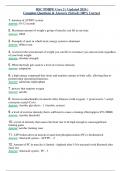
-
HSC PDHPE Core 2 ( Updated 2024 ) Complete Questions & Answers (Solved) 100% Correct
- Exam (elaborations) • 14 pages • 2024
- Available in package deal
-
- £8.15
- + learn more
HSC PDHPE Core 2 ( Updated 2024 ) Complete Questions & Answers (Solved) 100% Correct 1. duration of ATP/PC system Answer: 10-12 seconds 2. Maximum amount of weight a group of muscles can lift at one time Answer: 1RM 3. Example of sport in which lactic energy system is dominant Answer: 400m event 4. A term for the total amount of weight you can lift or resistance you canovercome regardless of your body weight Answer: absolute strength 5. When the body gets used to a level of exercise...
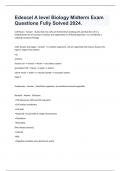
-
Edexcel A level Biology Midterm Exam Questions Fully Solved 2024.
- Exam (elaborations) • 16 pages • 2024
- Available in package deal
-
- £8.15
- + learn more
Cell theory - Answer States that new cells are formed from existing cells and that the cell is a fundamental unit of structure, function and organisation in all living organisms. it is considered a unifying concept in biology Cells, tissues and organs - Answer In complex organisms, cell are organised into tissues, tissues into organs, organs into systems e.g. animal↓ muscle cell → muscle → heart → circulatory system specialised cell → tissue → organ → system xylem vesse...
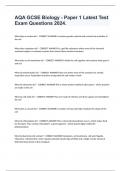
-
AQA GCSE Biology - Paper 1 Final Exam Prediction Questions 2024.
- Exam (elaborations) • 35 pages • 2024
- Available in package deal
-
- £13.46
- + learn more
AQA GCSE Biology - Paper 1 Final Exam Prediction Questions 2024.What does a nucleus do? - CORRECT ANSWER It contains genetic material and controls the activities of the cell What does cytoplasm do? - CORRECT ANSWER It's a gel-like substance where most of the chemical reactions happen. It contains enzymes that control these chemical reactions What does a cell membrane do? - CORRECT ANSWER It holds the cell together and controls what goes in and out What do mitochondria do? - CORRECT ANS...

-
AQA GCSE Biology Paper 1 100% Correct Answers Verified questions 2023/2024
- Exam (elaborations) • 26 pages • 2023
-
- £8.24
- + learn more
What does a nucleus do? - answer It contains genetic material and controls the activities of the cell What does cytoplasm do? - answer It's a gel-like substance where most of the chemical reactions happen. It contains enzymes that control these chemical reactions What does a cell membrane do? - answer It holds the cell together and controls what goes in and out What do mitochondria do? - answer These are where most of the reactions for aerobic respiration occur. Respiration transfers...
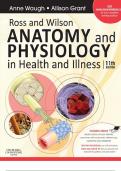
-
Ross and Wilson Anatomy and Physiology in Health and Illness_ With access to Ross & Wilson
- Lecture notes • 1316 pages • 2024
-
- £10.60
- + learn more
Levels of structural complexity Learning outcome After studying this section you should be able to: describe the levels of structural complexity within the body. Within the body are different levels of structural organisation and complexity. The most fundamental level is chemical. Atoms combine to form molecules, of which there are a vast range in the body. The structures, properties and functions of important biological molecules are considered in Chapter 2. Cells are the smallest indep...
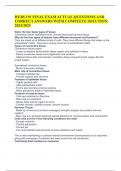
-
HUBS 191 FINAL EXAM ACTUAL QUESTIONS AND CORRECT ANSWERS WITH COMPLETE SOLUTION. 2024/2025
- Exam (elaborations) • 65 pages • 2024
-
- £14.28
- + learn more
HUBS 191 FINAL EXAM ACTUAL QUESTIONS AND CORRECT ANSWERS WITH COMPLETE SOLUTION. 2024/2025 Name the four basic types of tissue Connective tissue, epithelial tissue, muscle tissue and nervous tissue. Why do the four types of tissues have different structures and function? They are made up of different kinds of cells. They have different things that make up the extracellular matrix. They have varying amounts of extracellular matrix. Types of connective tissue Connective tissue proper - Lo...

-
AQA AS BIOLOGY 7401/1 Paper 1 Question Paper & Mark scheme June 2023 VERIFIED 100%
- Exam (elaborations) • 43 pages • 2024
-
- £14.69
- + learn more
AQA AS BIOLOGY 7401/1 Paper 1 Question Paper & Mark scheme June 2023 VERIFIED 100% What are the advantages of multi-cellular organisms? - --able to move -able to hunt(likely to he in top if food chain) -able to adapt to environment -specialised body reigons -able to find a mate What are the disadvantages of multi-cellular organisms? - -As they get bigger diffusion is less efficient and specialised exchange surfaces are needed Single felled organisms have a __________ surface area to volum...
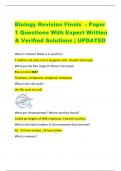
-
Biology Revision Finals - Paper 1 Questions With Expert Written & Verified Solutions | UPDATED
- Exam (elaborations) • 15 pages • 2023
-
- £10.60
- + learn more
Biology Revision Finals - Paper 1 Questions With Expert Written & Verified Solutions | UPDATED What is mitosis? What is it used for? 1 mother cell splits into 2 daughter cells. Growth and repair What are the four stags of mitosis? Acronym: Pee (on the) MAT Prophase, metaphase, anaphase, telophase What is the cell cycle? the life cycle of a cell What are chromosomes? Where are they found? Coiled up lengths of DNA molecules. Found In nucleus What is the total number of chromosomes th...
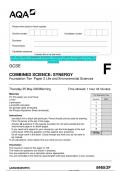
-
2023 AQA GCSE COMBINED SCIENCE: SYNERGY 8465/2F Foundation Tier Paper 2 Life and Environmental Sciences Question Paper & Mark scheme (Merged) June 2023
- Exam (elaborations) • 90 pages • 2024
- Available in package deal
-
- £6.52
- + learn more
2023 AQA GCSE COMBINED SCIENCE: SYNERGY 8465/2F Foundation Tier Paper 2 Life and Environmental Sciences Question Paper & Mark scheme (Merged) June 2023 [VERIFIED] GCSE COMBINED SCIENCE: SYNERGY F Foundation Tier Paper 2 Life and Environmental Sciences Thursday 25 May 2023Morning Time allowed: 1 hour 45 minutes Materials For this paper you must have: a ruler a protractor a scientific calculator the periodic table (enclosed) the Physics Equations Sheet (enclosed). Instructions Use...

£5.50 for your revision notes multiplied by 100 fellow students... Do the math: that's a lot of money! Don't be a thief of your own wallet and start uploading yours now. Discover all about earning on Stuvia


